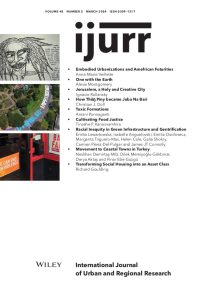Following South Sudan’s independence in 2011, a myriad of local, regional and global actors have flocked to its capital city, Juba, to influence and benefit from the ongoing state-making process. Drawing on ethnographic research conducted in Juba between 2012 and 2015, this article demonstrates how urban ‘space’ in Juba is rendered into ‘place’ through everyday practices of naming that articulate urbanites’ contrasting experiences of the Sudanese civil wars, the city’s tumultuous history, and their position within its—and the new nation’s—present and future. This is most visible in a growing and contested Juba neighborhood that has come to be called by two different names, each tied to distinct experiences of conflict and displacement within and beyond the city. These and other namings and place-makings index historically-rooted ethno-spatial understandings of South Sudan, memories of violence, and the sense of differential access to the city’s economic potential in the face of ongoing upheaval. Urban naming and place-making in Juba (and in other cities similarly impacted by conflict), it is argued, is a central domain through which urbanites disrupt official mappings and mitigate disorienting violence. These discursive practices are a vital means by which people forge stable lives and productive futures in the face of a precarious political present.
Details
Written by:
Christian J. Doll
Digital Object Identifier (DOI)
https://doi.org/10.1111/1468-2427.13214
About DOI

